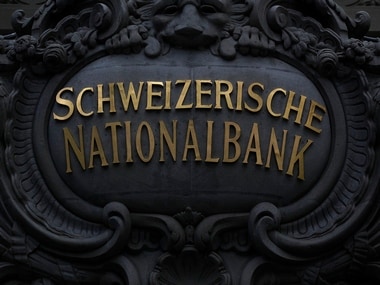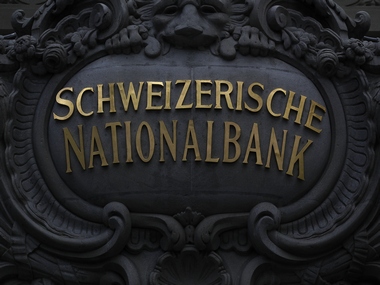The unexpected decision of the Swiss National Bank to abandon its exchange rate ceiling of 1.2 francs to the euro last week proves yet again that central bankers are not God. The abandonment of the peg – adopted three years ago to preserve Swiss competitiveness by preventing an excessive appreciation of its currency – is an admission that central bankers are fallible, and that even the most powerful central banks cannot fight against the tide of market sentiment and volatile capital flows. Most important, it is foolish to adopt currency pegs of any kind. The message will ring loudly in Greece, which is a victim of the eurozone’s common currency that forces it to compete in the export market with an overvalued euro. The Swiss National Bank’s jolt has ended the euro’s overvaluation, and a Greek exit – if that happens after this Sunday’s general elections – will force the eurozone to reconsider the folly of having one currency when national fiscal policies and inflation rates are divergent. Equally important, the world may come to realise that expecting central banks to revive growth with quantitative easing when national fiscal policies are turning to austerity may be fraught with risks. The NDA government has, luckily, shifted focus from demanding interest rates cuts to a possible fiscal stimulus in the next financial year, driven by public spending on infrastructure, but Europe and Japan, it seems, are still to learn the lesson. The abandonment of the euro peg immediately drove the Swiss franc higher and today (20 January) stands at around euro 0.98. The chances are people will draw the wrong lessons from the SNB’s decision to go back on its word. Paul Krugman, the US Nobel prize winning economist and unabashed believer in endless money printing as a cure for potential deflation, had this to say in an NYT blog. “What you need to understand is that all the usual rules of economic policy changed when financial crisis struck in 2008….In many cases, economic virtues became vices: Willingness to save became a drag on investment, fiscal probity a route to stagnation. And in the case of the Swiss, having a reputation for safe banks and sound money became a major liability.” What Krugman is essentially saying is that trying to preserve the value of a currency cannot be a central bank’s focus any longer. This is bunkum. If maintaining money’s value is not a central bank’s job, what is? V Anantha Nageswaran calls Krugman’s comment “bizarre” in a Mint column, and points out that the SNB should be commended for “reminding central bankers around the world that their core obligation is to preserve sound money and not write put options on stock markets.” The most important lesson to learn from the SNB decision, though, is simple: central banks cannot, and should not, try to bet against the markets beyond a point. It is one thing to manage exchange rate volatility (which is the Reserve Bank of India’s current, and sensible, policy), quite another to think you can roll back the waves with a central bank wand. The history of central banking is replete with instances of the markets defeating any artificially created peg against any currency or exchange rate standard. The US went off the gold standard in the 1930s under FDR when it was found to limit the Federal Reserve’s ability to print money and counter deflation during the Great Depression. In the early 1970s, Richard Nixon sent shock waves in the currency markets when he said the US would no longer have a fixed gold-dollar exchange rate. George Soros “broke” the Bank of England in the 1990s when Britain entered the European exchange rate mechanism (ERM) (precursor to financial integration in the eurozone) with an overvalued pound. Soros shorted the pound, and his eye-ball-to-eyeball with the Bank of England ended with the latter blinking and Britain’s ignominious exit from the currency peg. The pound was later devalued and allowed to float. [caption id=“attachment_1175521” align=“alignleft” width=“380”]  Reuters[/caption] The above examples also suggest that the euro, as currently structured, cannot hold. The eurozone is going through yet another crisis, both on the deflation front and due to the possibility of a Greek exit from the common currency if the Left-wing Syriza wins the polls due next Sunday. Syriza wants the European Union to write off a big chunk of its debts and abandon austerity measures in order to provide the beleaguered country some respite from unemployment and further impoverishment. Greek unemployment is currently nearly 26 percent – hardly the situation in which a country needs fiscal and monetary austerity. Greece needs the opposite – a higher fiscal stimulus - but Germany won’t allow that, believing as it does in fiscal and monetary fundamentalism. The real issue, once again, is a flawed euro arrangement where countries with varying fiscal policies are pegged to a common exchange rate against the world. If super-competitive Germany and struggling Greece have to compete for markets with the same currency, how is Greece ever going to recover except by cutting labour and other costs, leading to more poverty back home? Logically, only countries with similar fiscal strengths and converging inflation and other rates should be in a currency union. By staying in the currency union, the Greeks end up with an overvalued exchange rate and Germany with an undervalued one. Germany gets to export its way out of deflation, while Greece gets to suffer extreme austerity. The villain of the piece is clearly Germany. If Greece had opted out of the euro, its currency would depreciate dramatically and, after a brief period of crisis, its economy would probably bounce back on the basis of a super-cheap currency and dramatically rising exports. Later this week, the European Central Bank is expected to announce a fresh monetary stimulus of $635-640 billion in bond purchases. But what the eurozone needs is a moderate monetary stimulus and a larger fiscal one. A monetary stimulus in a deflating economy may end up boosting asset prices, whereas a fiscal stimulus will create new infrastructure and jobs. Europe needs jobs and investment more than just bond purchases. Central bankers can do only so much.
As Nouriel Roubini, professor at NYU’s Stern School of Business, noted in a recent column: “The right policies – less fiscal austerity in the short run, more public investment spending, and less reliance on monetary easing – are the opposite of those that have been pursued by the world’s major economies. No wonder global growth keeps on disappointing.”


)

)
)
)
)
)
)
)
)



